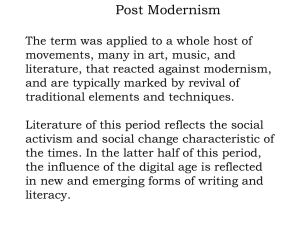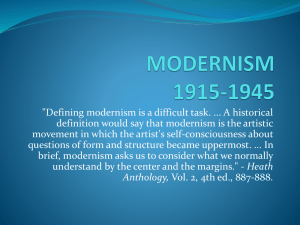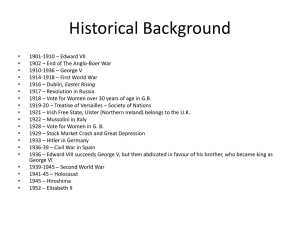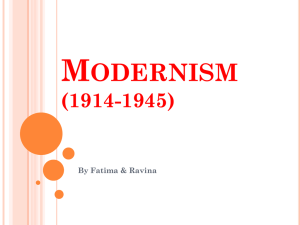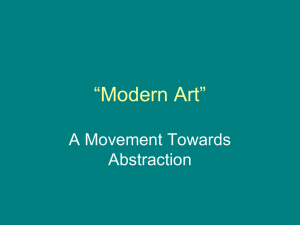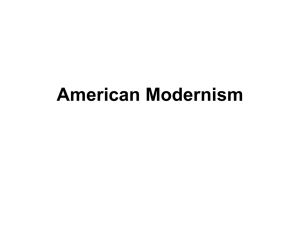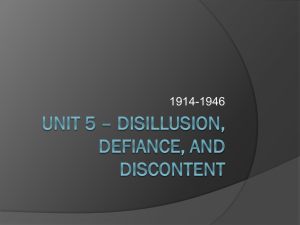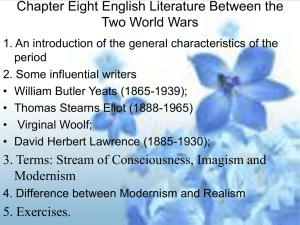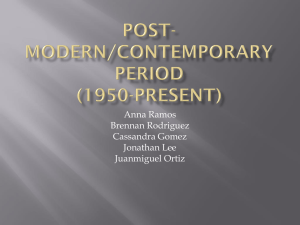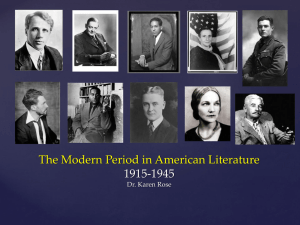Modernism
advertisement
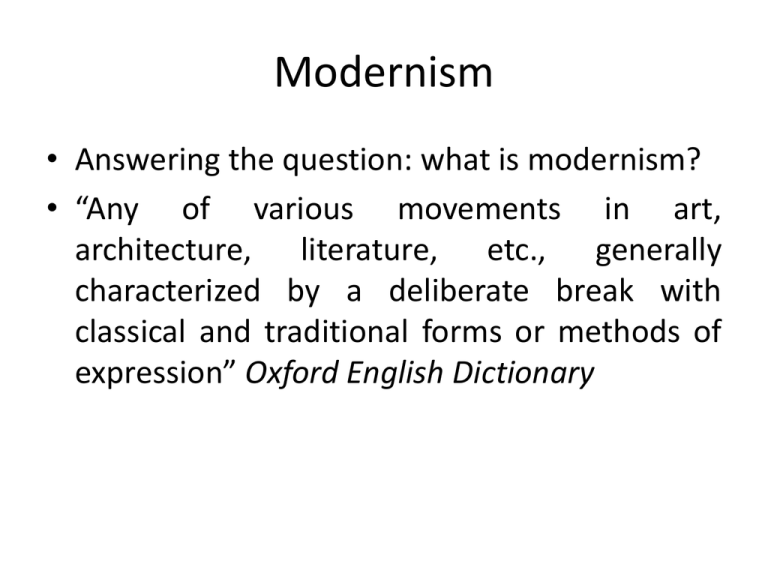
Modernism • Answering the question: what is modernism? • “Any of various movements in art, architecture, literature, etc., generally characterized by a deliberate break with classical and traditional forms or methods of expression” Oxford English Dictionary Modernism • “ache of Modernism” Hardy Tess of the D’Urbevilles (1891) • Robert Graves and Laura Riding, A Survey of Modernist Poetry, 1927. • Bradbury and McFarlane, Modernism a Guide, 1978. • Calinescu, Faces of Modernity, 1977. • Stan Smith, The Origins of Modernism, 1994. Modernism • Rabatè, The Ghosts of Modernity, 1996. • Mc Neil, “Vortex Marsden: A Little Magazine and the Making of Modernity”, 2000; Brooker and Perril, “Modernist Poetry and its Precursors”, 2001. • Whitworth, Modernism, Modernism • Peter Childs “time-bound art form” between the second half of the nineteenth century and the first half of the twentieth century. More precisely 1890-1930 • “genres-bound art form”. Modernism is associated with innovations and novelty. It has been stretched to include such British and Irish figures as John Donne, William Blake, Samuel Taylor Coleridge, and Lawrence Sterne.(Technical experimentation, self-conscious reflexiveness, uncertainty of reality) Modernism • Virginia Woolf (1924) “on or about December 1910 human charachter changed” • 1912 Imagism • 1913 Armory Show-New York • 1922 Annus Mirabilis Eliot’s The Waste Land • Joyce’s Ulysses Modernism • • • • • • • Modernism: Characteristics Ezra Pound: Make it new 1) Concerned with modern life 2) Complex 3) Chaos and fragmentation 4) History as a story of decline 5) Experimentation with the category of time Modernism • 6) Importance of myth • 7) Man in his primitive state • 8) It is more concerned with the mind than the body (free indirect speech, free direct speech, interior monologue, stream of consciousness). • Dramatic monologue: Browning, “My last duchess” • 9)Dichotomy between self and mass • 10) It prefers abstraction to empathy • 11) It prefers the concrete to the abstract • 12) Controversial subject matter • Readerly/writerly text Modernism • • • • • • Henry James : psychological realism Unreliable narrator Point of view Narrative voice. Centres of consciousness The Portrait of a Lady (1881) The Turn of the Screw (1898) Modernism • Conrad • Experiments with the temporal ordering of the chronological story • Reappearing tellers (Marlow: Lord Jim; Heart of Darkness • Henry James-H. G. Wells Modernism • Virginia Woolf • “Modern Fiction” (1925) • “Mr Bennett and Mrs Brown” (1923) Modernism • Examine for a moment an ordinary mind on an ordinary day. The mind receives a myriad impressions- trivial, fantastic, evanescent, or engraved with the sharpness of steel. From all sides they come, an incessant shower of innumerable atoms. [… ]Life is not a series of gig lamps symmetrically arranged; life is a luminous halo, a semitransparent envelope surrounding us from the beginning of consciousness to the end. Is it not the task of the novelist to convey this varying, this unknown and uncircumscribed spirit, whatever aberration or complexity it may display, with as little mixture of the alien and external as possible? Virginia Woolf, Modern Fiction, 1919. Modernism • Modernist Poetry • France:Symbolism (Rimbaud, Mallarmè Baudelaire). Influence on Yeats • United States: T. S. Eliot and Ezra Pound • Imagism Hulme • Pound, A few Don’ts by an Imagiste (1913) A Retrospect (1919) • Flint, Imagisme (1913) Modernism • Eliot «Tradition and the Individual Talent» 1919 first published in The Egoist and later included in The Sacred Wood: Essays on Poetry and Criticism (1920) • «the pastness of the past» but also «its presence» • Filament of platinum; oxygen and sulphur dioxide, sulphuric acid
